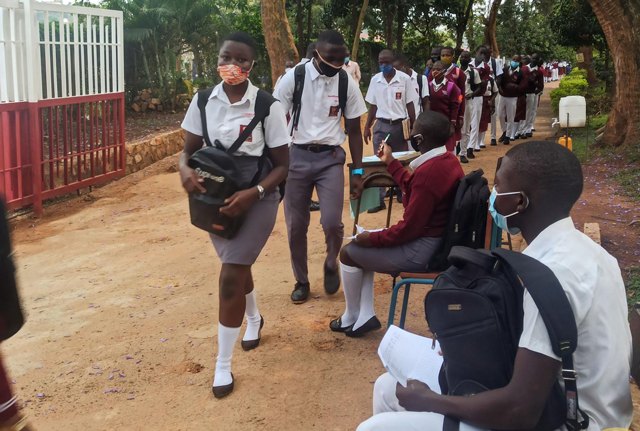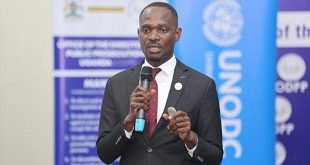
Kampala, Uganda | THE INDEPENDENT | Experts have said that the government’s plan to re-open schools after vaccinating learners aged 12 years and above is not feasible.
Last week, the government said that it was considering the vaccination of learners aged above 12, as one of the means to ensure safety and sustainable resumption of teaching and learning activities.
The idea, according to Janet Kataha Museveni, the Minister in charge of Education and Sports, is part of the plan developed by the education COVID-19 response committee and the national task force on COVID-19, to control the possible surge of infections among school-going children.
At the moment, the government has an estimated 586,080 vaccines–300,000 of them being Sinovac while the remaining 286,080 are AstraZeneca. However, none of these vaccines can be used on children below the age of 18 since the manufacturers have not carried out studies on their effectiveness.
Only Pfizer-Biontech vaccine has been tested on children aged 12 and above and has shown to be effective. While the country is expecting a consignment of 640,000 doses of Pfizer vaccine donated by the U.S, these can only vaccinate 320,000 children fully, leaving an estimated 1.9 million learners unaccounted for.
Dr Immaculate Amapire, the deputy programmes manager of the Uganda National Expanded Programme on Immunization says as of now, the expected Pfizer donations are what the government has or expects soon and have already been reserved for the targeted school-going children.
Dr Amapire adds that as of now, they hope that other vaccine manufacturers can start studies on the use of the vaccine on children so that there are more options available.
Filbert Baguma, Secretary-General Uganda National Teachers Union, notes that although vaccinating students and teachers could create a safe place for resumption of learning, it might not be a viable option at this moment.
Baguma says the government should think of workable plans that could facilitate the reopening of schools as soon as possible. His assessment indicates that if the government sticks on vaccination, schools might fail to reopen this year thus prolonging the challenges that come with closures including declined learning outcomes, school dropout among others.
Patrick Kaboyo, an educationist and technical advisor of Education Advocacy Group, says besides having a close-ended mind fixed on vaccination, the ministry of education should make wider consultations on how schools can be reopened.
“The ministry is reserved on the matter. They should open up to the public on what they are planning. Wide consultations can help them come to think outside the box and develop many viable alternatives,” says Kaboyo.
According to Kaboyo, strengthening enforcement of COVID-19 SOPs, empowering private and public schools with Covid-19 related items, and teaching in shifts can be a better short-term plan as the government mobilizes resources for the long-term options.
Professor Freddie Ssengooba, a public health specialist says there is no need for the government to vaccinate learners. He argues that since the reason for closing schools was widespread infections, by now many of the learners must have developed some sort of immunity to the disease. He says this immunity is as good as what they will get from receiving a jab or two of a vaccine.
Ssengooba adds that vaccination for children is not important since they are not as severely affected by the disease as adults are. He suggests that the government concentrate on vaccinating parents and elders in communities that can easily be infected by children.
Dr Elizabeth Ekirapa-Kiracho, a senior lecturer and Head of Department of Health Policy Planning and Management at the Makerere University School of Public Health says that vaccination is one of the best ways of minimizing infections in schools.
Dr Ekirapa-Kiracho however adds that given the uncertainty of how this can be achieved, governments should look at available options as applied in other countries.
She notes there is a possibility of reopening safely if the government can enforce the standard operating procedures by among other things strengthened surveillance, carrying out random testing, and establishment of heavy punishment to those who conceal cases.
Dr Ekirapa-Kiracho adds that the government can as well think of having shortened learning sessions of one month as it would be easier to control infection and remove the laxity that normally comes with long sessions.
In Rwanda for instance, schools reopened on Monday to enable students to complete the school calendar that was interrupted when all learning institutions were forced to close on June 29 due to a spike in coronavirus infections.
As schools reopen, education authorities have called upon schools to diligently observe Covid-19 preventive measures. These include physical distancing, proper wearing of face masks, hand washing with clean water and soap or use of sanitisers, and keeping windows open.
Similar arrangements are being undertaken in Kenya where they have already experienced the third wave of Covid-19. On top of Covid-19 protocols, Kenya has also embarked on vaccination of teachers and non-teaching staff.
International organizations like UNICEF have also assessed the situation and informed that reopening schools cannot wait for all teachers and students to be vaccinated given global vaccine shortages plaguing low and middle-income countries.
*****
URN
 The Independent Uganda: You get the Truth we Pay the Price
The Independent Uganda: You get the Truth we Pay the Price


